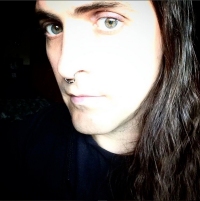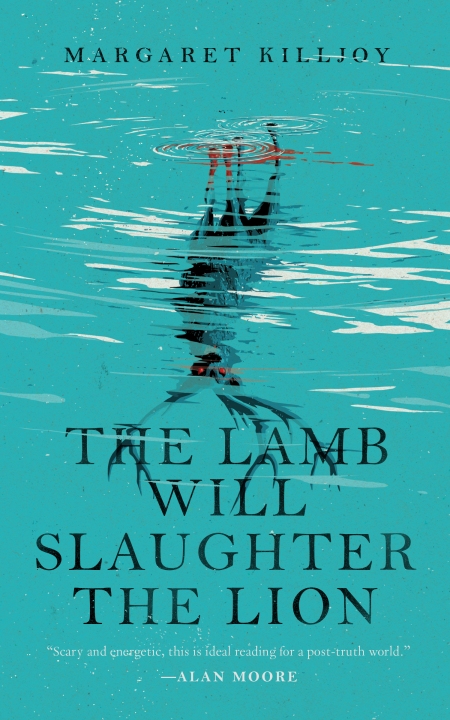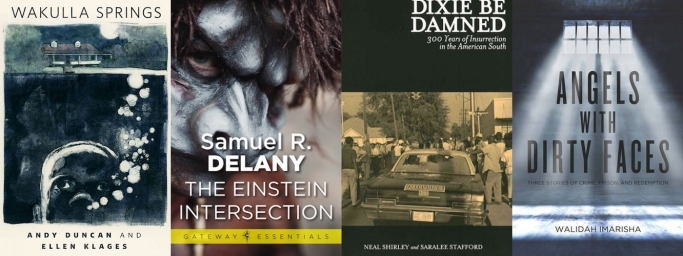 Let’s start with an introduction: Who is Margaret Killjoy?
Let’s start with an introduction: Who is Margaret Killjoy?
I’m an author who comes out of the DIY tradition of zines and has recently been making headway into traditional publishing. I’m recently-out as a transwoman and I’m a longtime anarchist organizer. I’ve spent most of my adult life traveling but just recently decided to hang my hat in the mountains of Western North Carolina.
Your new novella, The Lamb Will Slaughter the Lion, will be published by Tor.com in August. It looks rather fascinating: How would you introduce it to a potential reader? Is it part of a series?
The Lamb Will Slaughter the Lion is the first book in my Danielle Cain series, which follows a group of squatter-punk demon hunters. In the first book, our protagonist heads to a utopian town to figure out what happened to her dead best friend and stumbles upon magic and demons. It’s hard to describe the themes of a book without offering spoilers, but it’s a book about the ways in which we wield power over one another and it’s a book about a traveler trying to find home.
What inspired you to write the novella and series? And where do you draw your inspiration from in general?
This first book actually started off quite differently, as a non-speculative novella I wrote because I needed to read it. I wanted to write about a home for traveling folks, basically the big rock candy mountains. But the book was missing something, and quite some time later I figured out what: it was missing a three-antlered murderous deer. I rewrote the whole thing from scratch.
I draw inspiration from my experiences and the experiences of my friends, mostly. I tend to write about wanderers, queers, vagabonds, ne’er-do-wells, revolutionaries, criminals, and all the sorts of people I surround myself with in my life. I don’t think we’re very well represented in fiction at the moment, so I do my best.

How were you introduced to genre fiction?
My father kept the house more than well-stocked with science fiction when I was growing up. Early on, my tastes ran more towards fantasy, which I mostly had to grab during our family’s regular trips to the library. But by high school, I was poring through all my dad’s classic SF. Then I got too uptight for such frivolous writing and only read dead, boring european men for a couple years and became a pretentious asshole until I realized life was short. Now I read mostly genre fiction again.
How do you like being a writer and working within the publishing industry?
I realized, at some point, that telling people I wanted to be a professional writer is like telling people I wanted to be an astronaut. Sure, that is technically a job people have, but dream on. But here I am, a barely-scraping-by professional writer at the beginning of her career. I love it. It’s scary as hell, sure. In the world of zine publishing, you don’t work with gatekeepers. You just write a thing, lay it out, photocopy it, and give it to people. If they like it a lot, they might print or copy it themselves and distribute it further. If not, then not many people see it and no harm done, you just work on the next thing. My small press work was the same way: I’ve started plenty of periodicals from time to time. SteamPunk Magazine was the one that took off, so I put more work into it than I put into some of the other stuff I was doing. I never bothered to ask permission or get approval for work before I did it.
Now that I’m working in traditional publishing, things are different. I have to please editors and I have to write things that people might actually want to read. But having that small press and DIY background keeps me from freaking out too hard about failure. If I write something that an editor doesn’t like, then maybe I’ll scrap it or maybe I’ll decide to self-publish it. No big deal either way.
And honestly? I think learning to write things that might sell is an awesome challenge and makes me a better writer. My goal as a writer is to communicate ideas. If I’m able to communicate them widely, I have succeeded to a greater degree than if I write something only ten people will appreciate. As long as I can do that without compromising the ideas I want to communicate, of course.
Do you have any specific working, writing, researching practices?
I write fairly fast. If I could get myself to write on a regular schedule, I’d be so much more productive than I am. But no, I write in fits and spurts. Sometimes I write 3k words a day for three weeks. Sometimes I don’t write fiction for months at a time. I didn’t write a word of fiction between Donald Trump’s election and February, when I had to get back to work on the second Danielle Cain novella.
On the craft side of things… Mostly I write in silence, but when I ghostwrite romance novels, I put on loud stoner metal to obliterate my brain and just get the job done. I used to “pants” my books (writing by the seat of my pants), but now I’m a believer in outlining. Specifically, I write an outline, then I write a chapter, then I readdress my outline based on the new information provided to me from having written that chapter, and repeat until I finish the story or book or whatever it is I’m writing. I’ve recently taken up micro-outlining, where before I sit down each day I roughly sketch out what’s going to happen in the next couple of scenes. This speeds my writing up substantially, even if it hurts my brain sometimes.
I admit I tend to write books that don’t require a ton of technical or historical research, especially now that I’ve moved away from Victorian-era and steampunk work. I think the main thing I do a lot of that is similar to technical research is writing-the-other research. I want to represent characters who are dissimilar to me, so I spend a fair amount of time talking to friends, picking their brains, running ideas past them, etc. If I fail completely, I might abandon a character, a side plot, or even an entire story rather than misrepresent people I care about.
I’ve also developed a kind of nasty habit of asking my friends for details on rather traumatic specific experiences: “What were you thinking, as you saw the tire coming toward your head when that SUV ran you over?” and things like that.
When did you realize you wanted to be an author, and what was your first foray into writing? Do you still look back on it fondly?
I think on some level I always “knew” I was going to be an author, but I mean, if I’d wound up a scientist or something I would probably say I always “knew” I was going to be a scientist. My dad ran a zine in the 80s, and I recently found a story I wrote when I was probably 5. In high school I started taking writing more seriously. I helped run the literary magazine and we published a cyberpunk story I wrote about a biohacker who ran away from home and lived in a squatted building and had a crush on basically a manic pixie dream girl. I remember hating writing that story, because there were so many things I didn’t know how to do yet. How do you get a character from one place to another? Do you describe their walk, or just cut to a new scene? Questions like that. I have definitely not looked at that story ever again. I also wrote a feature-length screenplay about a gang of criminals in a world where anyone under 30 had no rights. There was a revolutionary conspiracy in which most of the main figures were actually squirrels operating human-looking robots via levers inside the head.
Fast forward several years and I made the decision to be a writer more consciously while I was living in a squatted tenement building in the south bronx. I probably decided to be a writer because there was this fabulous old rolltop desk in my bedroom, right next to the cracked window that overlooked the highway and the river. Streetlight came in through that window and lit up the bare mattress on my floor, and I don’t know, becoming a writer at that point was probably as much an aesthetic choice as anything else. So I started writing stories. Those times, in comparison to writing in high school, I look back on fondly.
What’s your opinion of the genre today, and where do you see your work fitting into it?
It’s great, it’s always been great, it will always be great. It’s probably more-great than it used to be, because there’s a more conscious effort to expand the pool of voices and experiences in genre fiction right now. But genre fiction is awesome because it’s constantly reinventing itself and because people are always just doing whatever the hell they want. And sure there’s probably lots of garbage misogynist work and garbage misogynist authors but that’s true of the real world also, and we’ll just fight them in genre the same as we fight them in the real world.
If I’m being honest, I didn’t expect to be taken seriously or accepted at all by the more mainstream genre world (the world outside of zines and DIY) because I write about anarchists and criminals and trans people and all of that. But, as I’ve learned, there have been anarchists in our ranks the entire time and believing in a world of self-determination and cooperation hasn’t really hindered me at all. I think as long as you’re willing to put in the work on your craft, people are just excited to hear from as many different voices as possible.
It’s also been a massive boon to have had a… let’s go with storied… past. I don’t tend to draw my story inspiration from existent novels, but from life experiences that folks have related to me or that I’ve been through. (I do get my craft inspiration from existent books, and am proud to be part of a tradition.)
Do you have any other projects in the pipeline, and what are you working on at the moment?
Well, I’m on contract with my non-fiction publisher, AK Press, to write a review of political strategies one might use to move us towards an egalitarian society, but I’ve also got about half of a near-future SF draft done and two other ideas in the outlining stage.
What are you reading at the moment (fiction, non-fiction)?
Last night I started Wakulla Springs by Andy Duncan and Ellen Klages, and I’m about halfway through The Eintstein Intersection by Samuel Delany. Delany can make trashy pulp read like poetry and I love him for it. As for non-fiction, I’m working on Dixie Be Damned by Neal Shirley and Saralee Stafford. It’s an overview of southern rebellions (real rebellions, which aim to increase liberty instead of deny it) that does wonders to redeem the South. I’m also reading Angels With Dirty Faces by Walidah Imarisha, who works in genre as well.

If you could recommend only one novel to someone, what would it be?
Oh god.
Uh, right now, off the top of my head, The Fifth Sacred Thing by Starhawk, a utopian novel. It’s not a masterwork of prose (she’s primarily a nonfiction writer and an activist) but it was hugely influential on me when I was in my early twenties.

What’s something readers might be surprised to learn about you?
I disagree with most of his political positions pretty intensely these days, but Heinlein is one of my favorite authors and his books were intensely influential on me when I was a kid. I’m a pretty open book, so it’s hard to know what would surprise people to learn about me.
What are you most looking forward to in the next twelve months?
Realistically, what I’m most looking forward to in the next twelve months is a book tour to support The Lamb Will Slaughter the Lion. Ambitiously, I’m looking forward to being part of the movement that takes Trump out of office, smashes the alt-right, and inspires people to discover autonomy and cooperation instead of putting their trust into politicians.
*
Margaret Killjoy‘s The Lamb Will Slaughter the Lion is due to be published on August 15th by Tor.com in the US and UK.
[…] Also on CR: Interview with Margaret Killjoy […]
LikeLike
[…] Also on CR: Interview with Margaret Killjoy […]
LikeLike
[…] on CR: Interview with Margaret Killjoy (2017); Review of The Lamb Will Slaughter the […]
LikeLike